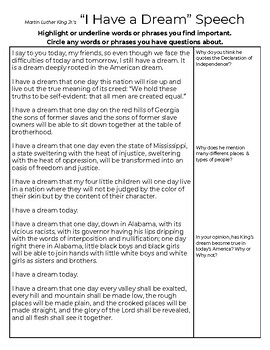
This sweltering summer of the Negro's legitimate discontent will not pass until there is an invigorating autumn of freedom and equality. It would be fatal for the nation to overlook the urgency of the moment and to underestimate the determination of the Negro. Now is the time to lift our nation from the quicksands of racial injustice to the solid rock of brotherhood. Now is the time to open the doors of opportunity to all of God's children. Now is the time to rise from the dark and desolate valley of segregation to the sunlit path of racial justice. This is no time to engage in the luxury of cooling off or to take the tranquilizing drug of gradualism. We have also come to this hallowed spot to remind America of the fierce urgency of now. So we have come to cash this check - a check that will give us upon demand the riches of freedom and the security of justice.

We refuse to believe that there are insufficient funds in the great vaults of opportunity of this nation. Instead of honoring this sacred obligation, America has given the Negro people a bad check which has come back marked "insufficient funds." But we refuse to believe that the bank of justice is bankrupt. It is obvious today that America has defaulted on this promissory note insofar as her citizens of color are concerned. This note was a promise that all men would be guaranteed the inalienable rights of life, liberty, and the pursuit of happiness. When the architects of our republic wrote the magnificent words of the Constitution and the declaration of Independence, they were signing a promissory note to which every American was to fall heir. In a sense we have come to our nation's capital to cash a check. So we have come here today to dramatize an appalling condition. One hundred years later, the Negro is still languishing in the corners of American society and finds himself an exile in his own land. One hundred years later, the Negro lives on a lonely island of poverty in the midst of a vast ocean of material prosperity. One hundred years later, the life of the Negro is still sadly crippled by the manacles of segregation and the chains of discrimination. It came as a joyous daybreak to end the long night of captivity.īut one hundred years later, we must face the tragic fact that the Negro is still not free. This momentous decree came as a great beacon light of hope to millions of Negro slaves who had been seared in the flames of withering injustice.

on August 28, 1963įive score years ago, a great American, in whose symbolic shadow we stand signed the Emancipation Proclamation. He won the Nobel Peace Prize in 1964 for his "nonviolent struggle for civil rights." On April 4, 1968, King was shot and killed while standing on a balcony of his motel room in Memphis, Tennessee, U.S.I have a Dream by Martin Luther King, Jr August 28, 1963ĭelivered on the steps at the Lincoln Memorial in Washington D.C. In his campaign for racial equality, King gave hundreds of speeches, and was arrested more than 20 times. Under King's leadership, the SCLC promoted nonviolent resistance to segregation, often in the form of marches and boycotts. In 1957, he was elected president of the Southern Christian Leadership Conference ( SCLC), which became a leading civil rights organization. Like his father and grandfather, King studied theology and became a Baptist pastor. King was born in Atlanta, Georgia, United States, in 1929.
MLK I HAVE A DREAM SPEECH PDF SKIN
His speech became famous for its recurring phrase “I have a dream.” He imagined a future in which “the sons of former slaves and the sons of former slave owners" could "sit down together at the table of brotherhood,” a future in which his four children are judged not "by the color of their skin but by the content of their character." King's moving speech became a central part of his legacy. On August 28, 1963, Martin Luther King, Jr., took the podium at the March on Washington and addressed the gathered crowd, which numbered 200,000 people or more.


 0 kommentar(er)
0 kommentar(er)
